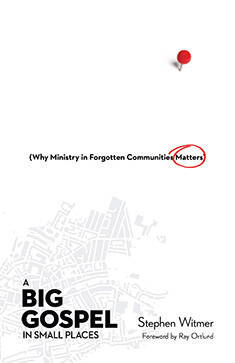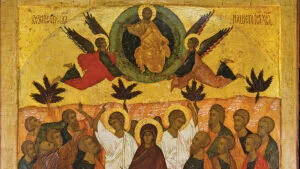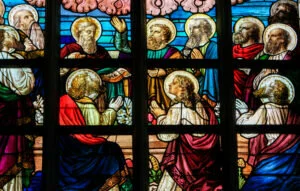Well, this is a very encouraging development for small-town ministry and for all who long to enliven, enrichen, and extend it through reflection and discussion about its theology and praxis. When did you last see a book on rural ministry (let alone two books on rural ministry) receiving extended critique from top-notch practitioners and scholars? I’m grateful to Sapientia for pulling together a remarkable group of contributors. I’m thankful to Gavin Ortlund for his careful reading and summary of my book, and to Brad Roth, Mickey Klink, and Anthony Njuguna for their fruitful interaction and critiques.
Brad Roth puts his finger on a tension between my vision of “cruciform incarnationality” (thanks for that phrase, Brad) on the one hand, and the widespread desire for growth strategies among rural church leaders (as well as a kind of “replacement motif” in evangelicalism) on the other. As Brad notes, entrepreneurial evangelicals tend to want results. And those results have often in fact come to justify the existence of evangelical churches. For me, this was the most insightful part of Brad’s response: the narrative that “oldline churches were fine for their day, but they lost their way and now must be replaced by gospel-centered, Bible-believing, evangelical churches” has tended to make numerical growth essential for those new churches. As Brad says, “growth justifies and generates identity. Without numerical growth, evangelical leaders are pastoring ‘just another church.’” Brad sees this as the greatest challenge to bringing my theological vision for small-place ministry to fruition. Here’s the question he poses: “How can an evangelical narrative that often includes growth and replacement align with [Witmer’s] cruciform incarnationality and the sometimes low-growth rural context?”
I agree with Brad that this tension poses a challenge, and I’m confident Brad agrees with me that the evangelical impulses he has identified are precisely why it’s important for rural ministers to be encouraged to think theologically and be formed spiritually in biblical ways (after all, that’s what both of our books attempt to do).
But I think the challenge may be a bit more multi-faceted than Brad’s response suggests. Yes, many rural pastors are restless for numerical growth and need to be encouraged and reminded that small, slow, and “unstrategic” can be uniquely precious gifts. But let’s be honest: others are too restful in the quiet normality of their rural church and ministry. They’re comfortable. They may be coasting. Rather than a gentle pat on the back, they need a good kick in the pants. They need to be challenged and reminded that God wants their best efforts, fervent prayers, and prayerful faith. He wants them to long for conversion growth as much as he does.
As small-town/rural pastors, we must each fight a two-front battle in our own hearts: a battle against both burnout and lethargy, against being overly restless and overly contented, against being too aggressive and too passive. This is why I want to beat the drum of encouraging small-place ministers to long for numerical growth more (because we’re eager for the spiritual transformation of lives) and to need it less. The reason this paradoxical exhortation is more than an empty sound bite is that it is founded in and funded by the very gospel we’re devoting our lives to preach in the small places. The gospel announces to us that we cannot be loved by God more than he already loves us in Christ. We don’t need to make something of ourselves by excelling in ministry (least of all by excelling according to the world’s standards of rapid numerical growth, big budgets, and big buildings), because we already possess the perfect righteousness of Christ. When our identity is rooted in Christ and his gospel, there’s ballast in our boat during the storms. We’ll stay steady even when our church attendance dips. But equally, we’ll pray often and work hard for attendance to rise, because we long for this precious, liberating gospel to be known and embraced by those we live alongside. I’m agreeing here with Brad, who ends his response by identifying the need to reconfigure our desires to God and refound “the cast of our identity in Christ’s self-emptying cross.” I believe that’s absolutely right.
Brad is (like me) a North American small-town pastor. As such, he represents the core intended audience for A Big Gospel in Small Places. But I also had a larger audience in mind when I wrote the book. So, what a massive encouragement it is to read the responses of Mickey Klink (who is not a small-town pastor) and Anthony Njuguna (who is not from North America). Mickey is an American New Testament scholar and the pastor of “a church that exists somewhere between the big city and the small town,” and Anthony Njuguna is a Kenyan scholar, with years of experience teaching rural African pastors, who is seeking to think theologically and contextually about his own rural context.
What I’m trying to accomplish in A Big Gospel in Small Places is limited in both breadth and depth. I write mainly from my own context of North American small-town ministry, since that’s what I know best. And I aim to show how one might think theologically about rural ministry. I do so mainly by drawing upon the gospel and the character of God. My goal is to sketch the first lines and lineaments of a theological vision for rural ministry—not to provide a final or comprehensive word on the subject, but to show how it might be approached. Laying out the theological vision for rural ministry would be an impossible task for one person, since theological vision is necessarily rooted in local context, and there’s not just one kind of “rural.”I aim to show how one might think theologically about rural ministry. I do so mainly by drawing upon the gospel and the character of God. That’s why my rather ambitious goal for the book is to invite other small-town/rural ministers to help build a rural theological vision by thinking, writing, and communicating theologically and contextually from and about their own local communities and ministries. This partnership will provide a breadth and depth that one person never could. Many thousands of rural contexts around the world will inform a rural theological vision. And of course, there is an ocean’s depth of theology that I didn’t plumb in my book and that can and should resource rural ministry.
I have also had hopes that, since the book is theologically rooted, it might even provide some biblical resources to help and encourage those in city and suburban ministry. Part of the thrust of A Big Gospel in Small Places (and I’m glad that the respondents in this symposium seem to have recognized this) is to move away from pitting city or suburban ministry against small-town ministry, and instead to value each kind of ministry and find ways to work together.
All this to say, Mickey and Anthony are just the kinds of conversation partners and collaborators I was hoping for.
Mickey’s response includes four pastoral-theological reflections based on his reading of my book: (1) Every place matters; (2) The heart matters; (3) The Bible wants us to think about every place; (4) The church—every local church—needs a theological vision for place and “placeness.” These four reflections get at some of the most significant contributions of A Big Gospel in Small Places and I’m grateful for Mickey’s pointing to and probing of them.
The final section of Mickey’s response offers some critique, as he raises the question of whether my book “focuses too much on place and not enough on people.” Gospel ministry, he says, must focus on place and people. In fact, the Bible focuses more on people, and less on where they live. Mickey doesn’t want to deny the difference between a big city and a small town, but he does hold that the love of Christ can “transcend place, no matter its size.”On the one hand, people are people wherever they live. There’s much commonality between urban, suburban, and small-town ministry. On the other hand, place matters. If I’m understanding him rightly, Mickey is zealous to guard against potential divisions (‘Prioritize the city!’ ‘Hoorah for the small town!’) by emphasizing the priority of people as people, no matter where they live.
Mickey raises an important tension—one I regularly face as I seek to encourage small-town/rural pastors. On the one hand, people are people wherever they live. There’s much commonality between urban, suburban, and small-town ministry. On the other hand, place matters. It matters for many reasons, not least because humans are embodied and therefore must always live in some particular place, in some level of proximity to other embodied humans. The Bible’s vision of the new creation in Revelation 21–22 is communicated in terms of space and place, humans living in a particular kind of community (a garden-city). In this respect, I’d like to push back against Mickey’s langue of Christ’s love “transcending” place. I think he means that Christ’s love meets humans wherever we live, and of course I agree with that. But it’s also true that his love meets those who have been formed in particular ways, in part by where they live and who they live with. That formation is important, not necessarily something to be transcended. Strikingly, the risen Christ identified himself to Saul as “Jesus of Nazareth” (Acts 22:8). He was a man of a certain place.
Mickey’s critique is valuable in evaluating both the importance and danger of attending to the “placidness” of people. I do think it’s important to write (and read) books on small-place (or city or suburban) ministry. I do think gatherings of small-place (or city or suburban) pastors should be encouraged. There are unique challenges and opportunities that come with the rural/small-town context, and there’s a particular encouragement and camaraderie that can be fostered among those in these overlooked places. But the danger of focusing on a particular type of community, whether city or country, is the potential for fostering an unhealthy pride in place (‘My ministry is uniquely difficult,’ ‘I have fewer resources than others,’ ‘My city is world-class,’ ‘I’m changing the world’). Remembering and loving the particular people in each place guards us against that pride. And of course I agree with Mickey that we ought to cherish and love people in every place. That’s why I wrote the book—because I’m concerned that small-place souls are being overlooked, and I want to ensure that they (as well as city and suburban souls) receive fruitful gospel ministry.
For this same reason, I’m particularly excited to see Anthony Njuguna seeking to discern how a rural theological vision might be worked out in his native Kenya. Anthony is correct in his assumption that my intended primary audience for A Big Gospel in Small Places was not an African audience—not for lack of interest on my part, but rather for lack of experience and expertise.Anthony particularly wrestles with translating my definition of ‘small places’ (i.e., communities that are relatively small in population, influence, and economic power) into his Kenyan context. I’m thrilled that he’s taking up the invitation to move toward next steps in his own context. He’ll be able to do it far better than I.
Anthony particularly wrestles with translating my definition of ‘small places’ (i.e., communities that are relatively small in population, influence, and economic power) into his Kenyan context, in which sixty-eight percent of the population lives in rural areas. He suggests that, because of this reality, “what is considered a small place in the USA is actually a big place in Kenya.” I agree there’s a striking different in context here; on most definitions of ‘rural,’ the rural population of the United States is less than twenty percent of the total population and it’s bound to make a difference that that number is nearly seventy percent in Kenya! And yet I don’t think this particular demographic disparity is as problematic for my theological vision project as Anthony fears. While it’s true that the overall population of Kenya is majority rural, it’s important to note that it is still majority rural. I’m no expert on Kenyan demography, but I assume that ‘rural’ (in the statistics Anthony cites) is based on markers such as the lower population, lower density, and greater distance from metropolitan areas of individual communities. When I refer to small places, I’m referring to those individual communities rather than the overall percentage of the population that lives in them. Of course, to the extent that Kenyans are rapidly moving into rural areas, this will create a different dynamic from many (though not all) of the small places I consider in my book. The experience of loss from outmigration in many American rural communities is pervasive and profound. But, then, there’s a wide variety of rural places (even in America). My recognition of multiple ruralities and a continuum of rurality is robust enough to include varying experiences of rural. It may be that a rapid influx of population will eventually transform a particular area of the Kenyan countryside into an influential suburb or city. To that extent, it will no longer qualify as a small place on my definition. At that point, although it will no longer be the focus of my book, it certainly won’t escape the attention of a God who seeks worshipers in every community (Acts 18.10)!
When Anthony asks, “Is population that significant an aspect to consider?” he’s getting at some of the same issues raised by Mickey. Anthony is correct that my desire is for us to go wherever God sends us, to places big, small, and in between. But attention to place and community matters for a couple reasons. First, because the more recent evangelical impulse has been to steer clear of the forgotten places and focus on the big cities, it’s important to call us back to a more biblical posture. Second, because the sizes and kinds of communities in which people live shape people and ministry, it’s important to understand the unique dynamics of a small place for the sake of effective ministry there.
I’m thankful for Gavin, Brad, Mickey, and Anthony, and for their fruitful ministries. My prayer is that the discussion and interaction of this symposium will continue to stir us all up to effective ministry, wherever we live.








Comments
Be the first one to make a comment!